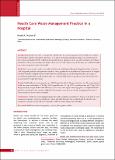Please use this identifier to cite or link to this item:
https://hdl.handle.net/20.500.14356/2021Full metadata record
| DC Field | Value | Language |
|---|---|---|
| dc.contributor.author | Paudel, R | - |
| dc.contributor.author | Pradhan, B | - |
| dc.date.accessioned | 2023-06-06T05:45:22Z | - |
| dc.date.available | 2023-06-06T05:45:22Z | - |
| dc.date.issued | 2010 | - |
| dc.identifier.citation | PaudelR., & PradhanB. (2011). Health Care Waste Management Practice in a Hospital. Journal of Nepal Health Research Council. https://doi.org/10.33314/jnhrc.v0i0.232 | en_US |
| dc.identifier.issn | Print ISSN: 1727-5482; Online ISSN: 1999-6217 | - |
| dc.identifier.uri | http://103.69.126.140:8080/handle/20.500.14356/2021 | - |
| dc.description | Original Article | en_US |
| dc.description.abstract | Abstract Background: Health-care waste is a by-product of health care. Its poor management exposes health-care workers, waste handlers and the community to infections, toxic effects and injuries including damage of the environment. It also creates opportunities for the collection of disposable medical equipment, its re-sale and potential re-use without sterilization, which causes an important burden of disease worldwide. The purpose of this study was to find out health care waste management practice in hospital. Methods: A cross-sectional study was conducted in Narayani Sub-Regional Hospital, Birgunj from May to October 2006 using both qualitative and quantitative methods. Study population was four different departments of the hospital (Medical/Paediatric, Surgical/Ortho, Gynae/Obstetric and Emergency), Medical Superintendent, In-charges of four different departments and all sweepers. Data was collected using interview, group discussion, observation and measurement by weight and volume. Results: Total health-care waste generated was 128.4 kg per day while 0.8 kg per patient per day. The composition of health care waste was found to be 96.8 kg (75.4%) general waste, 24.1 kg (8.8%) hazardous waste and 7.5 kg (5.8%) sharps per day by weight. Health staffs and sweepers were not practicing the waste segregation. Occupational health and safety was not given due attention. Majority of the sweepers were unaware of waste management and need of safety measures to protect their own health. Conclusions: Health care waste management practice in the hospital was unsatisfactory because of the lack of waste management plan and carelessness of patients, visitors and staffs. Therefore the hospital should develop the waste management plan and strictly follow the National Health Care Waste Management Guideline. | en_US |
| dc.language.iso | en_US | en_US |
| dc.publisher | Nepal Health Research Council | en_US |
| dc.relation.ispartofseries | Oct, 2010;232 | - |
| dc.subject | Health care waste | en_US |
| dc.subject | Management | en_US |
| dc.subject | Practice | en_US |
| dc.subject | Sub-regional hospital | en_US |
| dc.title | Health Care Waste Management Practice in a Hospital | en_US |
| dc.type | Journal Article | en_US |
| local.journal.category | Original Article | - |
| Appears in Collections: | Vol 8 No 2 Issue 17 October 2010 | |
Files in This Item:
| File | Description | Size | Format | |
|---|---|---|---|---|
| 232-Article Text-230-1-10-20130822.pdf | Full text Article | 188.54 kB | Adobe PDF |  View/Open |
Items in DSpace are protected by copyright, with all rights reserved, unless otherwise indicated.
